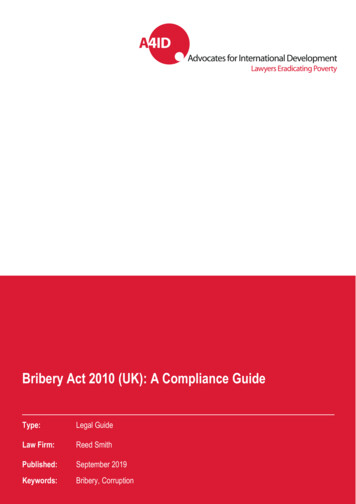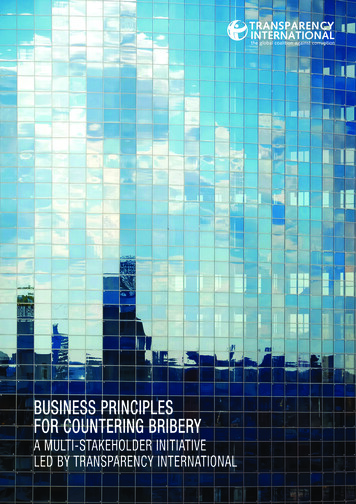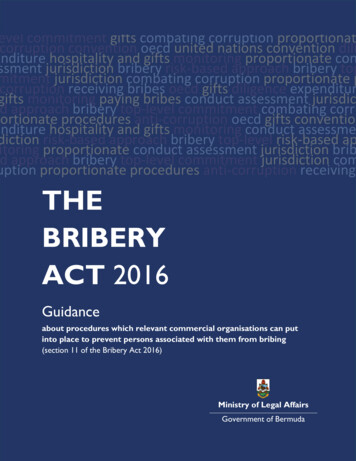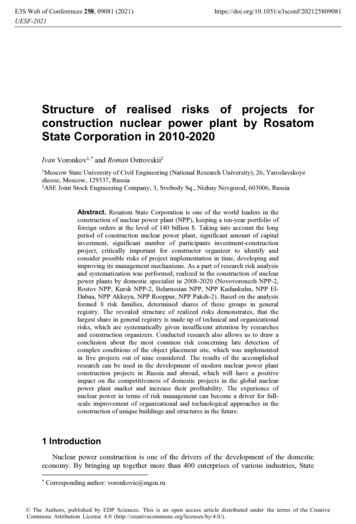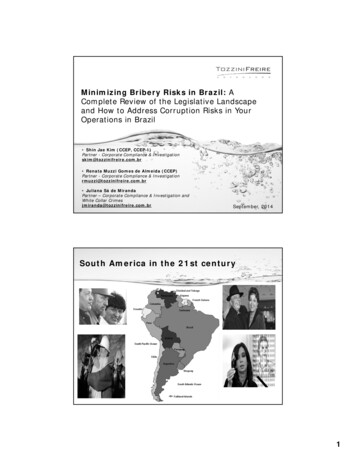
Transcription
Minimizing Bribery Risks in Brazil: AComplete Review of the Legislative Landscapeand How to Address Corruption Risks in YourOperations in Brazil Shin Jae Kim (CCEP, CCEP-I)Partner - Corporate Compliance & Investigationskim@tozzinifreire.com.br Renata Muzzi Gomes de Almeida (CCEP)Partner - Corporate Compliance & Investigationrmuzzi@tozzinifreire.com.br Juliana Sá de MirandaPartner – Corporate Compliance & Investigation andWhite Collar Crimesjmiranda@tozzinifreire.com.brSeptember, 2014South America in the 21st century1
South America in the 21st centuryBusiness Environment in SouthAmerica Low level of transparency Sense of impunity for corrupt conduct Presence of the Government in the economy Lack of compliance culture Labor legislation among the world’s most restrictive, specially the rulesregarding hiring and firing of employees Countries with high levels of concentration of wealth Countries with decentralized and multi-faceted power structures - seeka series of approvals from several different government authorities2
Over regulation in Latin AmericaEconomyEase ofDoingBusinessRankFilteredRankStarting aBusinessDealing withConstructionPermitsTradingGetting Registering Getting Protecting PayingEnforcing ResolvingAcrossElectricity PropertyCredit Investors TaxesContracts InsolvencyBordersPuerto Panama555315377133012118Bahamas, 19301029Venezuela, RB181322522321022313232928Source: World Bank/IFCMain Risks Corruption and bribery Tax fraud Labor (privacy; sexual and moralharassment; moral damages;health and safety; etc.) International Trade (local andinternational laws; import andexport controls; customsregulations) Fraud Antitrust Conflict of Interest Environment Commissions, rebates anddiscounts Insider trading Money laundering Crimes against the FinancialSystem Government contracts Gifts and entertainment) IP (laws involving protection oftrade secrets etc) Donations Consumer relations3
TI – Corruption Perceptions Index 2013ResultsFCPA Enforcement in South America Out of 17 cases examined as of 2009 up to now:CountriesPROSECUTIONSArgentina5Brazil3Costa Rica2Honduras2Venezuela2Panama14
FCPA Enforcement in South America Key Industries: Healthcare companies – 4 cases Energy Industry – 3 cases Manufacturing company – 3 cases DOJ v. SEC: 17 cases – 9 cases prosecuted by both DOJand SEC; 5 cases only by SEC and 3 cases by DOJ Payment – subsidiary companies or use of third party, orcombination of bothFCPA Enforcement in South America In 10 cases, third-party agents were used as means of payment Direct payment by subsidiary companies occurred in 3 cases A combination of the two means of payment was used in 4cases All 14 cases prosecuted by SEC involved the violation of theFCPA’s books and records provisions, 7 cases also involved theviolation of anti-bribery provisions5
is Brazil?WhatWhatis Brazil?Territory: 8,515,767 km2(5th largest)Immense Territory(5th largest)Coastline: 7,367 kmPopulation: 202.,7 millionGDP: US : 2.25 trillionGDP per capita: US :11.400What is Brazil?What is Brazil? Democratic country Foreign investor- friendly Spoken Language is Portuguese and not Spanish Federation composed of 26 States and one Federal District (Brasilia isthe capital city) and more than 5700 Municipalities Mixed race and ethnicityIn the world: 7th largest economy and 7th largest in purchasing powers 1st orange producer 3rd largest manufacturer of commercial aircraft 7th car producer 5 times World Cup Champion6
Scenario in BrazilScenario in Brazil Increase of concern on reputational risks Highly regulated Media pressure Active NGO’s Active and strong regulatory agencies Active Prosecutors, with experts in different sectors Increase and severe administrative penalties Legal requirement in certain sectors Market requirements (clients, business partners, financingagents, etc.)7
International Conventions ratified byBrazil OECD Convention on Combating Bribery of Foreign Public Officialsin International Business Transactions in 2000 OAS Inter-American Convention Against Corruption in 2002 UN Convention Against Transnational Organized Crime in 2004 UN Convention Against Corruption in 2006Brazilian Clean Company Act:Introduction Law n. 12.846/2013, better known as the “ Anticorruption law” or “Brazilian Clean Company Act”, inforce since January 29, 2014 Administrative and civil liabilities on legal entities for nistration involving: Corruption activity Fraud in government contracts8
Brazilian Clean Company Act:Introduction-Applicable to any incorporated or non-incorporated business-Offenses:(a) promise, offer or give, directly or indirectly, undue advantages topublic official or related parties;(b) fund, sponsor or subsidize any infringement of the law;(c) To make use of an individual or legal entity interposed to conceal ordissimulate its real interests or the identity of the beneficiaries of thewrongdoing;(d) defraud competitive bids, tenders or government contracts by settingterms with competition; or(e) create obstacles for enforcement actionBrazilian Clean Company Act: Liability Strict liability for acts of corruption committed in theirinterest or benefit Not necessary to prove that the management or directors had acorrupt intent Does not exclude the personal liability of individual violators Successor liability (corporate restructuring, mergers,acquisitions and spin-offs) Joint liability of controlling, controlled, affiliates or companiesin consortium9
Brazilian Clean Company Act: Sanctions Administrative Sanctions:-Fine up to 20% of the entity’s gross revenues in the year prior to theinitiation of the administrative proceedings, or even up to R 60 million incircumstances in which it is not possible to calculate gross revenues;-Publication of the condemnatory decision on media of wide circulation. Judicial Sanctions:-Loss of assets, rights or valuables derived from the illicit act, except forthe right of the harmed party or third-party in good faith;-Suspension or partial interruption of company’s activities;-Prohibition to receive incentives, grants, donations or financing frompublic entities and financial institutions owned or controlled by thegovernment, for a period of 1 to 5 years;-Compulsory dissolution of the legal entity, in some specific situations.Brazilian Clean Company Act: LeniencyAgreement Leniency Agreement- cease the conduct- effective collaboration that results in:- identification of other parties involved, when applicable- obtaining evidence of the illegal conduct Entering into a leniency agreement will result in a reduction orexemption of certain sanctions (i.e.: publication of the decision) Does not exempt the company from the obligation of full restitution ofthe damage caused Rules for granting leniency program - Necessary to have transparency inrules and benefits of the leniency program, predictability, trust in theauthorities, reasonableness, obeying to confidentiality rules10
Brazilian Clean Company Act: ethics andcompliance programs“VIII - Existence of mechanisms and procedures for integrity, auditing andincentives to report irregularities, as well as effective application of codesof ethics and conduct within the legal entity.”The evaluation parameters of compliance programs will be established byregulation from the Federal Executive BranchBrazilian Clean Company Act: FinalProvisions Blacklisting - “National Registry of Punished Companies”(CNEP) - Public list created within the Federal ExecutiveBranch to gather and publish information on sanctions imposedunder this law. The statute of limitations is 5 years as of the date of theacknowledgment of the violation or, in case of a permanent orcontinuous violation, from the date it has ceased11
Challenges Decentralization of enforcement authorities: multipleinvestigations and proceedings Multiple fines and penalties Concurrent application of various laws and rulings Lack of criminal amnesty for individuals Unclear benefits of the leniency agreement Lack of experience of the authoritiesCriminal provisions Brazilian Criminal Code- Active and passive domestic corruption- Active corruption and traffic of influence in international businessoperations identification of other parties involved, when applicable Bribery of foreign public officials was included in the Criminal Code in2002 as a result of the implementation of the OECD Convention onCombating Bribery of Foreign Officials in international businesstransactions Facilitation payments, as the one allowed under the FCPA, are illegaland may be considered bribe12
Criminal provisions NO CORPORATE CRIMINAL LIABILITY FOR CORRUPTION Even if a company is the ultimate beneficiary of the bribery, thecorporation cannot be held criminally liable for the crime of corruption Only individuals may be criminally prosecuted, even if the individualacted on behalf and to benefit the company Directors, managers or any employee may be held liable forcorruption when acting as representatives of the corporation Lack of anticorruption laws applicable to the private sectorPublic OfficialsWhoever holds a position, job or performs a public duty, eventemporarily or without any remunerationExamples: staff of public institutions, police officers, senators,deputies, judges, arbitrators, Petrobrás employees, doctors andnurses in the public hospitals.13
Undue Advantages Any benefit given aiming at having the public official act or refrain fromacting in relation to the performance of their official duties Non-monetary benefits, such as travels or gifts that are extravagant orfrequent may be considered undue advantageCriminal provisions: internalinvestigations No regulation Assessment of the implications of reporting the corruption to theauthorities Company’s exposure Acceptance of the evidence gathered in the internal investigation inCourt Increase control measures to prevent future violations Evaluate the effectiveness of the corrective action14
Search and Seizure: Current ScenarioGovernment investment in the Federal Police Department – hiring and training of personnelCooperation agreements between the Federal Police and: economic regulators (CADE) tax authorities food and drug regulators (ANVISA)International cooperation agreements between Brazil and the USA, Switzerland, France, China, Portugal and Italy.Increase in the number of operations conducted by the Federal Police involving large companies and public officialsSearch and Seizure – You should Follow the authorities closely during the search Deliver copies of the requested documents instead of theoriginals Take notes on the conduct of the action and the documents thatare taken Make the search as organized as possible15
Search and Seizure – You should not Destroy or delete documents or electronically storeddata Provide information that is not requested Render a statement or authorize the interview ofemployees during the search Answer any question that you do not know the answerto Sign any document without your lawyer’s approval Leave the authorities alone during the searchTrends Enforcement increase No longer a matter of foreign legislation Increase of compliance due diligence (prior or/and postM&A, Consortium, JV) Compliance program implementation Increase of internal investigations Pending bill to award whistle blowers in action againstcorruption16
Any questions?17
operations identification of other parties involved, when applicable Bribery of foreign public officials was included in the Criminal Code in 2002 as a result of the implementation of the OECD Convention on Combating Bribery of Foreign Officials in international business transactions
